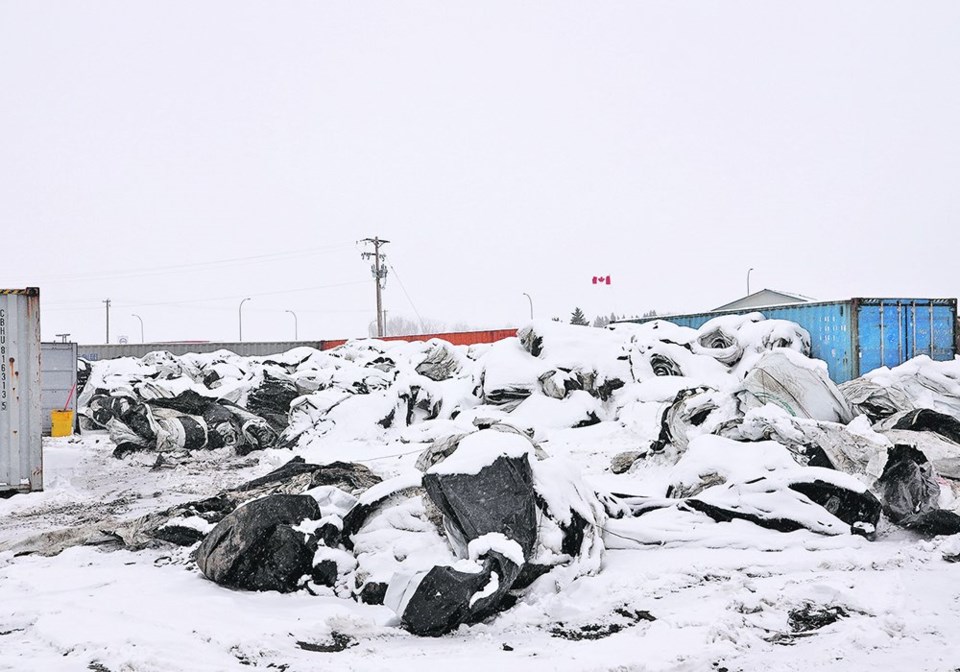YORKTON — A Yorkton, Sask., business operator says the provincial government is stifling his entrepreneurial efforts with its regulations around grain bag recycling.
However, the government says there is a place for Dallon Leger and EcoGenX if he follows the rules.
Leger began EcoGenX years ago after working on a farm where they burned the bags.
He thought recycling the plastic was a better idea so in 2017 he began an on-farm collection service.
“We’d go to the farm, we’d roll up your bags, we’d transport them back and we built relationships with the leading recycler in the (United States) who accepts all the plastic that we sent them,” he said.
That plastic is then turned back into grain bags, twine, silage tarps and other agricultural plastics for resale.
But government regulations that came into effect in 2018 state that he requires an approved product stewardship program designation to be able to do this.
Ontario-based not-for-profit Cleanfarms is the only one operating in Saskatchewan. Under the program, farmers deliver bags to more than 40 collection points set up by Cleanfarms. According to Leger, the bags must be rolled and tied with twine before drop-off, but some sites offer the rolling service.
The regulations also say the first sellers of the grain bags must collect and remit an environmental handling fee to Cleanfarms so they can operate the collection sites.
Leger became a first seller in 2021 and hasn’t remitted the EHF. He agrees he isn’t complying with the regulations, but he said that’s because he is working within a closed loop system with the American company.
“If a farmer is paying a recycling fee and I’m picking up, then that fee is going to cover that cost,” he said. “We’re not going to give it to Ontario if we’re doing all the work.”
Leger said the government has told him that he must comply or face enforcement. He argues that he has a better business model than the government at a lower cost.
“We’ve shipped over four million pounds already, all with no funding,” he said.
Leger also said environment ministry officials have taken photographs at his business location and told him if he doesn’t comply, they will get a court order and a warrant, seize his laptop, charge him and subject him to fines.
“I’m 30 years old now after a drought year as a start-up business,” he said. “I don’t have money to hire a lawyer.”
He issued a statement on Twitter saying he was out of business but said since the grain bag business doesn’t really start until July, he hopes to get an exemption from the government regulations.
Environment minister Warren Kaeding said officials have suggested Leger work with Cleanfarms, noting that the organization has issued a Request for Proposals looking for people to collect and transport bags.
He also said the ministry would entertain a product stewardship proposal from Leger if it included what the regulations require, such as a management structure, advisory committee and details on collection sites, how it would be funded and how it would be audited.
Kaeding said in 2018 Cleanfarms was the only organization to submit such a proposal to the government.
“He has never submitted that to us,” said Kaeding in an interview. “I have well documented our attempts to work with him, to communicate with him, to get him to understand what the program is and then ultimately what his responsibilities would be if he wanted to submit his own product stewardship program.”
He said the regulations are designed to make sure recycling programs work. The province doesn’t want a repeat of the tire pile at Assiniboia that cost taxpayers $3.3 million to clean up after a recycling business didn’t succeed.
As a first seller of bags, Leger must submit his EHF fees, which are 25 cents per kilogram. Kaeding said that rate has been the same since 2018.
Leger said this is his only source of income after quitting his on-farm job and buying a 40-acre property for his business buying, collecting and recycling grain bags.
“I understand why the regulation was put in place,” he said. “I get when this was done, I wasn’t around. I’m here now. Let’s have a conversation.”
He said a meeting with Cleanfarms didn’t go well after a previous article about his business was published and he wants the government to at least consider his business model.
“It’s important that people understand that I do have to shut this down because I didn’t start a business to sell grain bags. I started a business to solve a problem, which was the plastic, and if I’m just selling a bag I’m adding to the problem.”
Kaeding said in 2020 more than 4,000 tonnes of grain bags were sold and 2,800 tonnes collected. He said that 63 percent recovery rate isn’t unexpected given that even with SARCAN beverage recycling, where people get paid to return containers, the recovery rate isn’t 100 percent.
“One of the criteria is that they have to be pretty clean. That might be a problem if grain bags have been out for more than a year,” the minister said.

